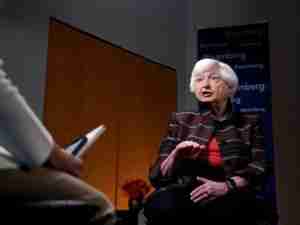The United States is still the world's largest manufacturer and one of its top exporters. But imports continue to outpace exports, increasing the US trade deficit and tripling US foreign debt since 1999, according to "Competitiveness Index: Where America Stands." It's a report based on two decades of economic data prepared by the Council on Competitiveness, a nonprofit public policy action group.
One-third of the trade deficit is oil, another third is with China, and the remaining third is everything else. But the report's authors say they are confident the US underreports exports, especially in intellectual property, where about $17 billion is lost annually on copyrights. The report, released as part of a two-day conference on US economic competitiveness, also found that US multinational corporations sell 300% more through foreign operations than through exports.
Michael Porter, a Harvard Business School professor and co-author of the report, said the notion that manufacturing drives the economy is antiquated. The services delivered by manufacturing are the key, evolving from flipping burgers years ago to rocket science and other technological operations today, he added.
The report concluded that the US trade deficit is not an accurate economic benchmark because America's intangible assets, including high-value services, global branding, technological knowledge, and scientific research cannot accurately be measured.
But the poor performance of American K-12 students can be quantified and has led to US college graduation rates falling below nine other countries among people aged 25 to 34.
"It's the No. 1 economic problem in America," and perhaps the "single biggest threat to future American prosperity," Porter said.
Energy inefficiency also is a concern. Two decades of relatively low prices have helped the US attain and maintain its global economic leadership position. But US demand for energy continues to exceed domestic supplies and other countries, including Japan and Germany, are outpacing American efficiency gains.
Still, the US economy has remained the world's largest over the last 20 years and had a 3.1% a year growth rate between 1986 and 2005, which outpaced other world powers like the European Union, which had a 2.4% growth rate, and Japan, which grew at 2.1% annually.
America was the engine for one-third of all growth in the global economy during the last 15 years, and while an astounding feat, that imbalance is unhealthy and the US must be more forceful in addressing international trade imbalances and enhancing the prospects of other nations, Porter said.
Total foreign direct investment in the US is now $1.6 trillion compared with $817 million in the United Kingdom, $601 million in France, and $426 million in Hong Kong, according to the report.
Looking ahead, Chad Holliday, chairman of DuPont Co. and of the council, said the September 11 terrorist attacks led to more stringent visa requirements and the full impact on the nation's ability to attract and retain foreign talent has yet to be felt.
The US also creates and destroys more jobs annually than most other nations, which leads to insecurity especially with health coverage issues, Porter said. (AP)








